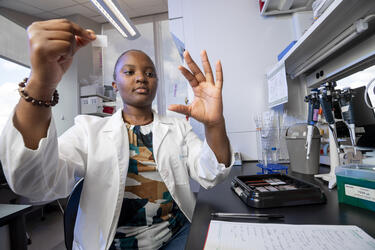Earn Both an M.D. and a Ph.D. in Seven Years
Biomedical research is shaping the future of medicine — advances made in biomedical sciences change not only how maladies are cured but also which are curable.
Do you have an intense interest in clinical and research aspects of medical sciences? If so, consider the M.D./Ph.D. dual degree program. This joint program is administered through both the Boonshoft School of Medicine and the College of Science and Mathematics. This program reflects the strong interrelatedness of scientific disciplines in medical research today, encompassing areas of clinical, biological, physical and computational sciences.
Overview
Major effort in bold
Years 1 and 2
- Biomedical summer research rotations, seminars, journal clubs
- Medical school basic science curriculum
- USMLE Step 1
Years 3–5
- Clinical correlates of research interest
- Ph.D. research and appropriate (but limited) advanced course work
- Thesis defense and Ph.D. degree awarded
Years 6 and 7
- Medical school clinical curriculum
- USMLE Step 2
- M.D. degree awarded
How to Apply
Admissions Criteria

Potential M.D./Ph.D. students must first be accepted into the Boonshoft School of Medicine. (See: medical school application and admission requirements.)
Dual-degree candidates must also apply for acceptance into the Biomedical Sciences Ph.D. Program through the Wright State University Graduate School. (See: Graduate School application and admission requirements.) An applicant’s MCAT scores may be used in place of the GRE score requirement. Please contact the program coordinator of the BMS Ph.D. Program once your application has been submitted to request that the MCAT scores are sent from the Boonshoft School of Medicine to the WSU Graduate School.
Three letters of recommendation are required for the BMS Ph.D. Program. Applicants may use the letters submitted with the Boonshoft School of Medicine application, or choose to submit new letters.
The application deadline for the BMS Ph.D. Program is March 1 for consideration for the following academic fall semester.
Requirements
The Doctor of Philosophy degree in biomedical sciences at Wright State University applies to students who have an M.D. degree or who have completed (or are enrolled in) the preclinical portion of the medical school curriculum at an accredited medical school where they are still enrolled in good standing. These students are exempted from all core courses of the Biomedical Sciences Ph.D. Program. Listed below is a summary of requirements to earn this degree:
- Complete advanced courses with a minimum GPA of 3.0 (B). Eighteen hours of advanced courses, two lab rotations, and six seminar courses are required. Depending on the area of concentration and the recommendation of the dissertation director, the student may petition to be exempted from 12 hours of advanced courses based on medical credit. Similarly, one of the two lab rotations may be exempted if the student has participated previously in a research project.
- Choose a dissertation director and a supervisory committee with the approval of the program director.
- Pass a preliminary examination as specified by the supervisory committee. The topics for the preliminary examination will be specified by the supervisory committee and generally will not be limited to the advanced curriculum taken by the student, as this may be only six hours of BMS courses.
- Successfully prepare a written dissertation proposal.
- Accumulate a minimum of 100 didactic laboratory and research quarter hours.
- Complete original research which makes a significant contribution of current scientific knowledge, submit an approved written dissertation and make a successful public defense.
- Be certified by the program director as having completed all requirements for the Ph.D. Degree.
- Meet residency requirements.
- Be registered in the quarter in which the degree is conferred.
- Present one copy of the approved dissertation to the Graduate School and one copy to the Biomedical Sciences program office, and
- Fulfill all requirements within nine years of entrance into the program.

